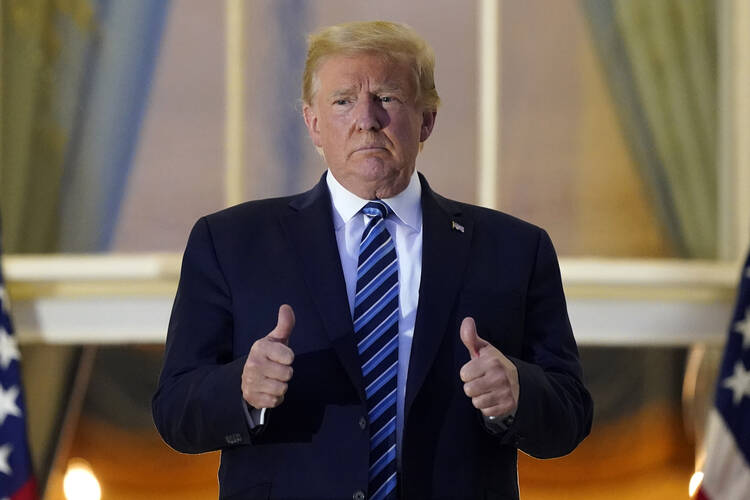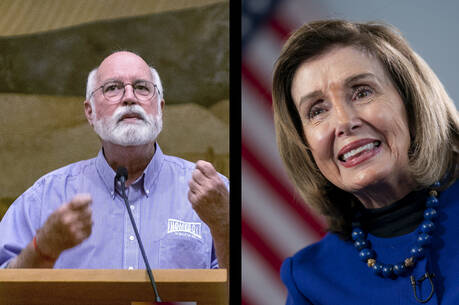Yesterday, President Trump announced on Twitter that he was leaving Walter Reed National Military Medical Center, where he was receiving treatment for his infection with the coronavirus, a disease that has killed over 200,000 people in the United States.
In his tweet, the president wrote: “Don’t be afraid of Covid. Don’t let it dominate your life.”
I will be leaving the great Walter Reed Medical Center today at 6:30 P.M. Feeling really good! Don’t be afraid of Covid. Don’t let it dominate your life. We have developed, under the Trump Administration, some really great drugs & knowledge. I feel better than I did 20 years ago!
— Donald J. Trump (@realDonaldTrump) October 5, 2020
Many people have been asking, sincerely, how President Trump’s comment, “Don’t be afraid of Covid,” differs from Jesus’ message to “Be not afraid.” Here are some thoughts.
First of all, Jesus often told his followers “Be not afraid.” In fact, the phrase brackets his earthly life. The Angel Gabriel says that to the Virgin Mary at the Annunciation, the beginning of Jesus’ earthly life (Lk 1:30). And after his Resurrection, the risen Christ says the same thing to his frightened disciples, near the end of his earthly life (Mt 28:10).
It’s one of the very few phrases Jesus utters several times in the Gospels. He frequently encourages his followers to turn away from fear and rely on God.
But Jesus is not telling his disciples, or us, to ignore the reality of human life. God does not ask us to check our brains at the door and be reckless about our bodies. That’s not what it means to be a believer. We don’t jump off of tall buildings expecting not to get hurt. We don’t drink poison expecting not to get sick. We don’t touch a hot stove expecting not to be burned.
God does not ask us to check our brains at the door and be reckless about our bodies.
God gave us brains for a reason. For that matter, God gave us reason for a reason. So “Don’t be afraid of Covid” not only makes no sense, but it’s dangerous. Like Jesus, we have human bodies that must be cared for. There are also others whom we have to protect from harm, from illness and from death. That is part of being pro-life: reverencing lives, both yours and those of others.
That means taking the necessary precautions to keep yourself healthy: going to the dentist every few months, getting an annual physical, taking medicine when needed. Today, it means, more specifically, taking precautions against Covid-19: wearing a mask, maintaining social distance, washing your hands and quarantining if you are ill or if you’ve recently come in contact with someone who may have been infected.
And yes, that means being reasonably afraid of Covid. It makes sense to be afraid of, for example, chickenpox, measles and meningitis. It makes sense to be afraid of diseases that can kill or cause long-term disabilities. And it makes sense both to treat these illnesses medically if you contract them and to be careful not to pass those illnesses to others.
Sometimes being afraid is both reasonable and charitable.
Jesus said, many times, “Be not afraid.” But his whole life was about giving life, not taking it. And by not taking precautions against Covid, you are endangering lives, both yours and those of others.
Trust in God, but listen to your doctors, too.
[More from Father James Martin: Faith in the time of Coronavirus]








